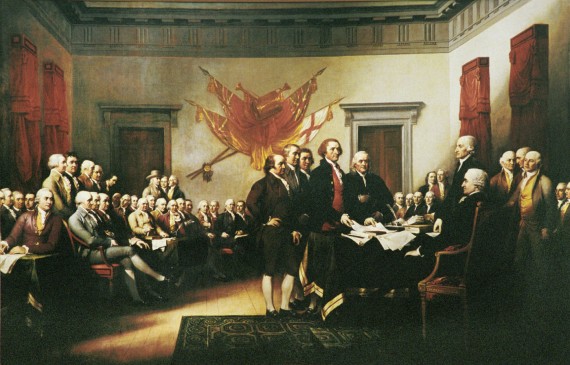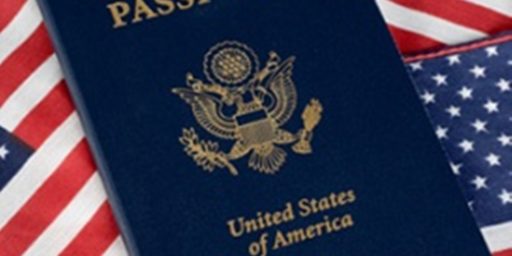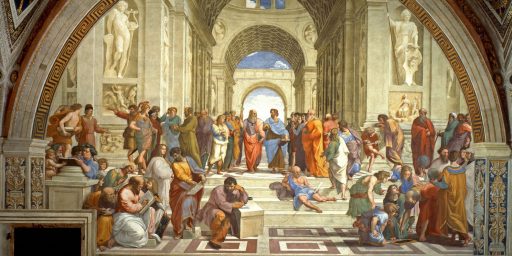Reflections On The 4th Of July In Light Of The Coup In Egypt
Yesterday's coup in Egypt, a day before we celebrate our own independence, reminds us of something else worth celebrating.
Today, we celebrate the 237th anniversary of the day that thirteen colonies on the shores of a still wild North American continent declared their independence from what was, at the time, the most powerful nation on the face of the planet and arguably the most powerful nation since the fall of the Roman Empire. It was, of course, merely the official recognition of a conflict that had begun, at the latest, at Lexington & Concord in April 1775. Nonetheless, it was a bold political statement directed at an absolute monarch who was clearly not going to accept being challenged in such a way by those he considered his subjects. What followed was seven years of conflict up and down the Eastern seaboard that ultimately led to victory at Yorktown and the establishment of a free nation. It took some time, and a misplaced experiment with the badly drafted Articles of Confederation, but by 1789 the United States of America, governed by a robust Constitution, was in existence, and it has continued to exist ever since then notwithstanding conflict and crisis, including a war that nearly tore the nation in two.
As I think about what happened on that July day in 1776, and everything that it set in place, I cannot help but find myself comparing it to what is happening in our world today. Just yesterday, we all watched on international television as the Egyptian military overthrew the first democratically elected President in that nation’s history and dissolve the first Constitution that had been approved by a popular vote in that nation’s history. This happened after only a single year of the Morsi regime in power, and just 29 months after Hosni Mubarak was forced from power by a civilian uprising that brought down his 30 year regime and, it seemed at the time, 60 years of military rule that had begin with the coup that overthrew King Farouk in 1952. And Egypt is by no means unusual in being a nation where democratic rule, if it has ever existed at all, doesn’t survive for very long.
By contrast, our nation has been lucky enough to survive more than two centuries of mostly peaceful transitions of power. Yes, there have been painful times. The first came at the Election of 1800 when the birth of the two-party system brought about an epic battle between two of our greatest Founding Fathers over the future of the nation. Another came in the 1820s with the birth of the Jacksonian era and the first real stirrings of populism in American politics. The most painful, of course, came 40 years later when the Election of 1860 led to secession, bitterness, and a war that ended with the death of more than half a million people. For the most part, though, while we’ve had our conflicts over political issues, our hard fought elections, our gridlock, and even our hateful rhetoric about people in and out of office, in the end we have a system where the public as a whole accepts the fact that political change happens one way and one way only, through peaceful and democratic means at the ballot box. Yesterday, we saw that there are still parts of the world that need to learn that lesson.
So, while you spend today drinking beer, eating hot dogs, watching parades and fireworks, and celebrating the well-deserved kick in the arse we gave to the British, let us also remember what those men in Philadelphia set in motion that hot day in July 237 years ago. Thanks to then, and those that followed, we’re able to change our political system without having to resort to, or worry about, tanks in the street, and where the idea of a General getting on television and telling us we have a new leader would be something that we’d revolt against rather than something that we’d cheer.







I think we were also more lucky than we sometimes understand. Things could have gone so wrong, despite what the Framers wrote down on paper, had we not had one George Washington to take on the job of POTUS. Mr. Morsi was no Washington.
I don’t know enough to jump to any quick opinions on what’s happening in Cairo; but, least we forget, democracy without respect for the rights of the minority is tyranny of the majority.
We should also remember that it took us a couple of tries (Articles of Confederation?) before finally finding our own constitution and have patience for their trials. I hope our Egyptian friends find the right answer for their problems that let their people live in peace.
Poor Egypt! Caught between the Mouthpieces of God and the Military Can Do No Wrong types. It’s like a power struggle between two GOP factions over there.
Only one way? Well, almost…
http://www.youtube.com/watch?v=o54n7HXwOhc
http://3.bp.blogspot.com/-syoU-n4MezI/TcQIcmnFX8I/AAAAAAAAGEI/8RDwXhNiGIQ/s640/The+Kent+State+shootings+-+May+4%252C+1970+05.jpg
Happy 4th of July!
May all your bottle rockets see the sky!
And not take out your eye.
@michael reynolds:
Washington never gets his due, does he? His precedents, combined with the election of 1800, aren’t appreciated very much, even by some history buffs.
Tradition – and an enormous frontier – have given America a remarkably stable government.
What bemuses me is that once the frontier vanished, those who reject the concept, responsibility, and mutual struggles of community no longer have an escape valve.
I always thought that’s what weed and the Magic Bus were for!
http://www.xtimeline.com/__UserPic_Large/38755/evt090920191100305.jpg
It’s been noted that part of the reason the American Revolution turned out better than many other revolutions is that in many ways it was more reactionary than revolutionary. A set of circumstance that most of the colonists were happy with had developed in the US. Following the French and Indian War, Britain started drastically changing the nature of it’s relationship with the US from a mostly hands off approach to more direct involvement.
The American Revolution largely just returned the colonies to the status quo before that.